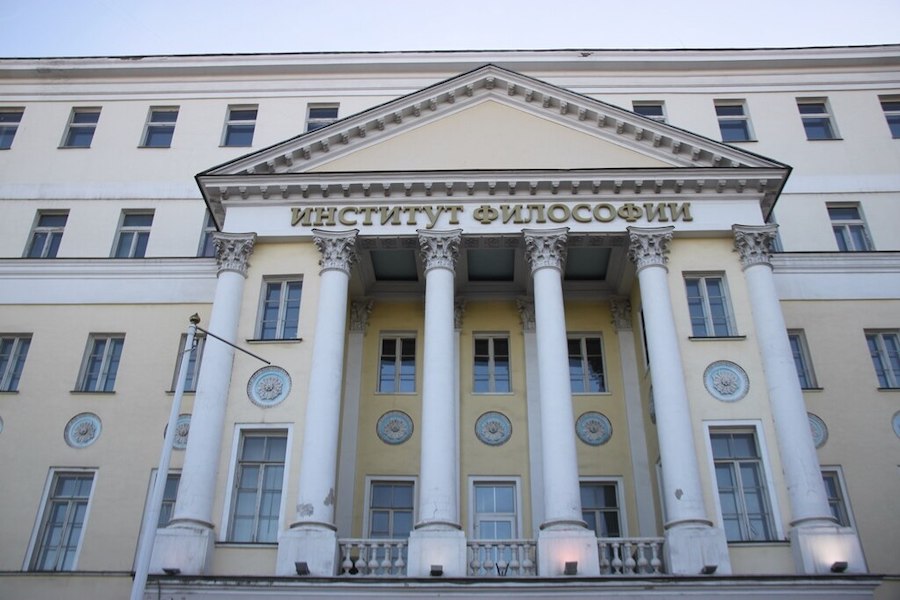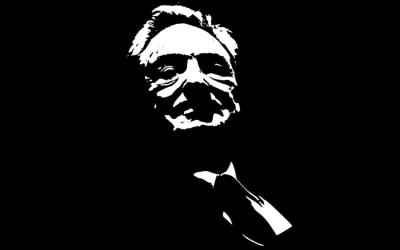The issue of power at the Russian Academy of Sciences’ Institute of Philosophy is resolved through staffing scandals and propaganda campaigns.
Andrei Rodin
At the beginning of 2024, Olga Zinovieva, widow of the philosopher Alexander Zinoviev and founder of the Zinoviev Club, made ideological accusations against the Institute of Philosophy of the Russian Academy of Sciences (IPhRAS).
The Zinoviev Club has been operating under the propaganda holding company “Russia Today” for ten years. The style of the accusations made were reminiscent of Stalin’s trials and the defamation of undesirables that occurred in the Soviet press at that time.
This spurred a variety of reactions from Russian and foreign-language media. The so-called “Z channels” (a Russian militarist propaganda symbol) supported the statements. Others, on the contrary, came to IPhRAS’ defense.
This conflict illuminates the state of Russian academia in the humanities.
But first, some background.
About the Author
For ten years—from 2012 to 2022—I held the positions of senior researcher at IPhRAS and associate professor the Liberal Arts and Sciences Department at St. Petersburg State University. In response to the Russian invasion of Ukraine, I emigrated with my family to France, renounced my Russian academic affiliations, and accepted a teaching position at the University of Lorraine in Nancy.
The Latest Elections
The most recent elections for director of the Institute of Philosophy took place at the end of 2020, in the midst of the COVID pandemic. By a majority vote of employees, Andrei Smirnov was re-elected to this post for his second term. Subsequent events prevented him from ever fully holding office.
The previous elections had been held in 2015. At that time, then deputy director Smirnov replaced the former director Abdusalam Guseynov, who himself took up the position of scientific director of the institute. The elections were required by the ministry of education. The age range of applicants was limited — this explains Guseynov’s transition to the position of scientific director. At the same time, Guseynov informally retained his grasp on the control levers within the institute. Neither the 2015 or 2020 elections featured any real competition between applicants or programs, but rather represented a carefully organized imitation of competition. In this regard, the election for the director of the Institute of Philosophy in these years was not much different from the next “Putin election.”
No Competition
In 2020, the only employee of the Institute of Philosophy who planned to challenge Smirnov (I will not mention his name, so as not to inadvertently cause harm), who also had an alternative development plan for the institute and strong support among the youth, was not allowed to participate in the elections by decision of the Academic Council.
Why were these elections such an obvious facade? Why didn’t the institute’s staff nominate real alternative candidates who represented their interests? Why did the Academic Council prohibit the only potential candidate who proposed to change the state of affairs at the institute from participating in the elections?
In my opinion, the answer lies partially in the fact that the administration at the institute essentially has unlimited power over ordinary employees, including the ability to deprive employees of material gains. The guaranteed salary is close to the minimum allowed by law. The remainder of the paycheck, which can be many times higher than the minimum salary amount, is distributed by the administration.
In addition, most employees work under a fixed-term contract, which the directorate of the institute can always refuse to renew.
In circumstances like these, an employee or a group of employees may try to convince their superiors to make this or that decision, but any attempt to change the leadership or do something against their will is doomed to fail.
The situation I describe here using the example of one institute obviously pertains to all of Russian academia.
The “Acting Director” Rule
There were also quite rational reasons behind the reluctance of most IPhRAS employees to use the elections for their intended purpose.
As subsequent events showed, elections themselves do not guarantee who will end up in the director’s chair. According to the “Basic Principles of the Organization and Activities of the Research Institute of the Russian Academy of Sciences,” the elected director of the Institute of the Russian Academy of Sciences “must be approved by the Presidium of the Russian Academy of Sciences for a period of up to 5 years” (paragraph 19).
In fact, approval from the RAS Presidium alone is not enough to guarantee a position as the director of the institute. The candidate elected and approved by the RAS Presidium only becomes an “acting director.” In order to officially assume the office, further approvals are required from the Ministry of Science and Higher Education, the Administration of the President of the Russian Federation and, as it turned out in the case of IPhRAS, from the Plenipotentiary Representative of the President of the Russian Federation in the corresponding federal district.
The Role of the Zinoviev Club
By the end of 2021, once the allotted approval period had already expired, Smirnov, who had been re-elected as director of IPhRAS, was approved by all authorities except the Plenipotentiary Representative of the President. As it turned out, this delay in the process was not accidental.
It was at this time that Olga Zinovieva, bypassing the formal procedure, tried to get the former deputy director of science and active member of the Zinoviev Club, Anatoly Chernyaev, appointed to the position of director of the Institute of Philosophy.
In early December, the IPhRAS Scientific Council published an open letter to Putin with a request to clarify the situation. But by December 22, Minister of Science and Higher Education Falkov had appointed Chernyaev director.
I do not know what strings Olga Zinovieva had to pull to achieve this. Considering the fact that in the same year, 2021, Putin signed a decree recognizing the “Year of Zinoviev” on a national scale, Mrs. Zinovieva has significant influence.
Nonetheless, this usurpation of IPhRAS was repelled within a week—through the efforts of the old directorate and most of the IPhRAS team. Scientific Director Guseynov played the main role in this effort. He managed to reverse the ministerial decision and be appointed to the position of acting director. He holds this position to this day.
“Civilization Development Project”
The press conference held by members of the Zinoviev Club in January 2024 marks a new stage in this confrontation. Regardless of how this conflict is resolved, it is clear that the question of power at the Institute of Philosophy of the Russian Academy of Sciences is resolved through staffing scandals and propaganda campaigns, and not with the help of formal election procedures.
IPhRAS has a good chance of coming out the victor in this confrontation thanks to its repeated proven loyalty to the current government.
The official position of the Institute of Philosophy today is that it is IPhRAS, with its planned “Russian Civilizational Development Project,” that best implements the country’s current agendas, including supporting the “special military operation.”
Academic Freedom or Loyalty?
Can what is happening at the Institute of Philosophy of the Russian Academy of Sciences be called a struggle for academic freedom and autonomy?
A possible change in the leadership of the institute as a result of the actions of the Zinoviev Club will certainly lead to a new level of censorship and repression, which will have a strict ideological character. Some employees will lose their jobs. In this sense, the management’s attempts to maintain the status quo are aimed at protecting against external ideological pressure.
However, when the freedom of philosophical expression depends entirely on the boss’ good will, whether at IPhRAS or in the Presidential Administration, this freedom is never complete. Defending academic freedom through unfettered loyalty to the dictatorship is, in principle, a dead-end path, although it may yield some visible results in the short term.
Intellectual resistance to dictatorship is incompatible with loyalty to the very same dictatorship. This is the Achilles heel of the loyalist resistance, which is constantly pointed out by the ideologists of the Zinoviev Club: they say that the institution’s support for the ruling regime is half-hearted and insincere.
“Benevolent” Dictators
Political dictatorship does not come from outside, but grows out of internal working relationships between people in collectives and institutions like IPhRAS throughout the country.
Any director of an academic institute or rector of a university in modern Russia is always a bit of a dictator, regardless of their individual personalities. They cannot voluntarily abandon their authoritarian role without creating bigger problems for themselves and their employees.
Therefore, conscientious people who find themselves in this position try to become “benevolent” dictators rather than going against the system.
* * *
The current crisis being experienced by Russian academia also presumes the possibility of changing it. Although today is not the right time to start designing plans for a bright and distant future, the task of democratic reform of the Russian academic system is not entirely hopeless.
Hopefully, the lessons of missed political opportunities in post-Soviet Russia will not be forgotten. And the next generation of reformers will not make the same mistake again by just as confidently and thoughtlessly following the path of reproducing a political dictatorship, as their older colleagues did at the beginning of the current millennium.
Andrei Rodin is a lecturer and employee at the Henri Poincaré Archive, University of Lorraine





0 Comments